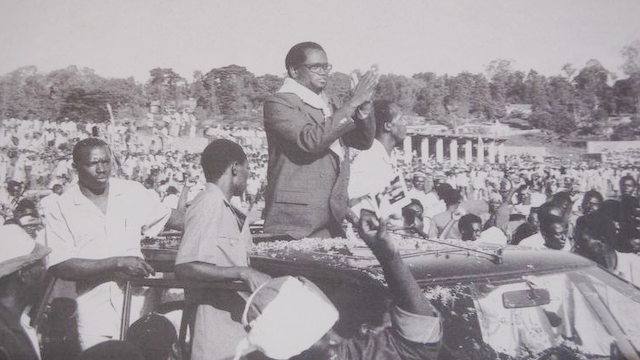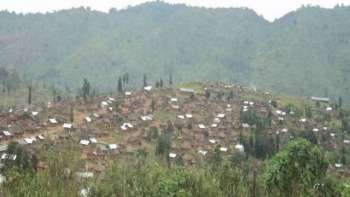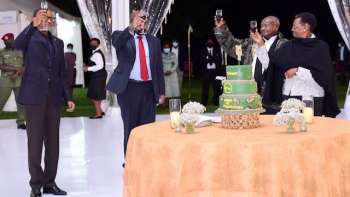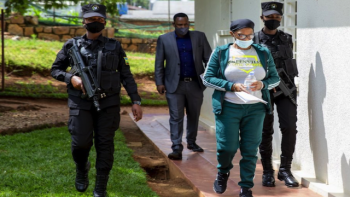Burundi's Supreme Court of Justice has condemned. "in absentia" the former President Pierre Buyoya, 70, and 18 other defendants following the trial for the assassination of Melchior Ndadaye, the first democratically elected Hutu president. Melchior Ndadaye was killed in October 1993, just 102 days after he took power, after defeating Pierre Buyoya, in the first democratic elections in Burundi.
Pierre Buyoya and fifteen other defendants, were sentenced to life in prison for the "assassination of the head of state, attempt against the authority of the State and attempting to carry widespread the massacres and devastation. They were also fined 102 billion Burundian francs or $53 million. Three other defendants were sentenced to 20 years in prison. One defendant, Antoine Nduwayo, the former Prime Minister from February 1995 to July 1996 and member of the Union for National Progress (UPRONA) was acquitted.
Opened in October 2019, the judges in the trial on the assassination of the first democratically elected Hutu president, Melchior Ndadaye delivered the verdict on Monday, October 19, more than a year after the opening and two days before the anniversary of Melchior's assassination, October 21, 1993. Most of the accused including Pierre Buyoya, apart from 4 senior military officers, five close aides of former President Buyoya during his rule and a few members of the gendarmerie, were absent during the trial and the sentencing. Like Pierre Buyoya, they left the country many years ago.
Pierre Buyoya is current the African Union Envoy to Mali and the Sahel and was appointed to the Burundi Desk within the Rwandan Defense Forces.
According to the AfroAmerica Network sources, the Burundi Desk Within Rwandan Defense Forces Staff is suspected of planning invasions of Burundi by Burundian armed rebels groups supported by Rwandan Military leaders. These armed opposition groups include some members of National Congress for Freedom (CNL) based in Rwanda, Popular Forces of Burundi (FPB), formerly known as Republican Forces of Burundi (FOREBU) , Resistance for the Rule of Law-Tabara (RED-Tabara) based in South-West Rwanda and South Kivu, in Eastern Democratic Republic of the Congo (DRC) and the Movement for Solidarity and Democracy (MSD), based in Southern Rwanda. (see AfroAmerica Network: Burundi Desk in Rwandan Defence Forces Led by Pierre Buyoya and General Jean Bosco Kazura ).
Assassinations and Civil War.
Melchior Ndadaye was assassinated on October 21, 1993, four months after being elected in the first democratic presidential elections in the country's history. He was killed, along with several of his cabinet ministers, in an ambush by Tutsi soldiers. When Melchior Ndadaye became president, for the first time, a person from Hutu ethnic group, that constitutes 85% of the population, was brought to power. Melchior Ndadaye created a government which relied on a balance between Hutus and Tutsis.
The assassination started a civil war, in which almost 300,000 people, mostly from Hutu ethnic group were massacred by the Tutsis from the army, the gendarmerie and various armed militias. Pierre Buyoya was accused of leading the assassination, following his failure to retain power through democratic elections.
This view was highlighted based on the way he came to power. In 1987, during ethnic tensions, Pierre Buyoya overthrew the late President Jean-Baptiste Bagaza and maintained power until 1993. Although he published an agenda of liberalization and patching relations between Hutu and Tutsi ethnic groups, according to Burundians, analysts and experts, he created and presided over an oppressive ruling military junta consisting primarily of Tutsi extremists. Expecting to retain power through June 1993 elections, he was disappointed and resentful when he lost to Melchior Ndadaye, a Hutu.
Cyprien Ntaryamira, Melchior Ndadaye's successor, was also assassinated in April 1994, as he was returning from Tanzania in the plane of Rwandan President Juvénal Habyarimana. The current Rwandan RPF leaders, which includes several officers that were members of Pierre Buyoya's regime are accused of having assassinated the two presidents and their close aids. Cyprien Ntaryamira was replaced by Sylvestre Ntibantunganya. As the Speaker of Parliament, Sylvestre Ntibantunganya, was appointed as president in October 1994, to lead a coalition government involving 12 of the 13 known political parties. The mainly Tutsi Union for National Progress (UPRONA) withdrew from the government and parliament and ethnic violences broke out. A number of Hutu refugees in Bujumbura, were killed by Tutsis soldiers and armed militias.
Pierre Buyoya then returned to power in 1996, following another coup, this time against Sylvestre Ntibantunganya. He then initiated the Arusha peace agreements of 2000 and the ceasefire. In particular, the agreement granted immunity to the members of old army dominated by the Tutsi minority, including himself.
African Union Dilemma: Support or Condemnation of an official accused of assassination.
Pierre Buyoya currently serves as the African Union's representative in Mali and Sahel.
Following the sentencing, Pierre Buyoya said, on Wednesday October 20, 2020: "We reject these judgements, which are in no way binding on us" and added that the trial is "purely political and a sham."
In November 2018, an international arrest warrant was issued against Buyoya. He had then said, referring to the late President Pierre Nkurunziza: "I am considered the number 1 enemy of the Nkurunziza regime" . He added that it was "another diversionary move aimed at burying painful, unresolved questions," referring to a political crisis in the nation following the 2015 elections.
He said that the officers who had killed Ndadaye had already been arrested.
The African Union has yet to comment on the sentencing. Also, the Rwandan Government, for which Pierre Buyoya leads the Burundi Desk, did not comment on the condemnation.
Trial at a Critical Junction: Pierre Buyoya's Condamnation and Open Relations between Rwanda and Burundi Governments?
The condemnation to life of Pierre Buyoya comes at a critical time. on July 10, 2020, Rwandan President General Paul Kagame expressed his intentions to work closely and amend the broken relations with the new Burundi government led by General Evariste Ndayishimiye (see here: ). The offer was quickly rejected by the newly elected Burundi President Evariste Ndayishimiye in August 2020, when he said: ““We do not want to renew relations with a country that uses hypocrisy. A cunning country. It is out of the question that there is a country saying it wants to make friends with Burundi, when it put a thorn in our side so that we may step on it" (see AfroAmerica Network: Burundi: President Ndayishimiye Accuses Rwandan Government of Holding Burundian Refugees Hostages )
On Tuesday, October 20, 2020, Vincent Biruta, who heads Rwandan diplomacy, welcomed his Burundian counterpart Albert Shingiro for a working visit, during a meeting, held in Rwanda at the common border of Nemba-Gasenyi.
After acknowledging the tense relations between Rwanda and Burundi and the negative consequences on exchanges between the populations of the two countries, Vincent Biruta, The Rwandan foreign minister said that the Rwanda government is ready to do anything to normalize relations. He labelled the meeting, the first of its kind in five years.
Albert Shingiro reaffirmed the Burundi government's supports of all efforts aimed at normalizing relations between the two countries, through direct contacts, without the need of a mediator.
Now the question is: How is Pierre Buyoya's condemnation related to the new open contacts, after initial firm rejections of normalized relations, between the governments of Rwandan and Burundi?
@AfroAmerica Network 2020
















